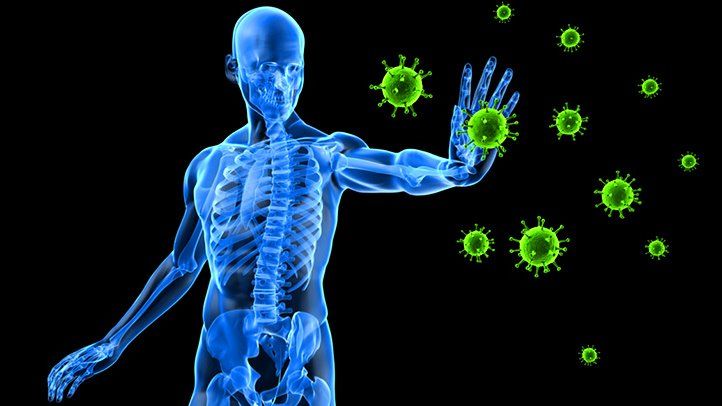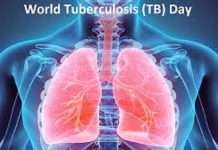Coronavirus disease (COVID-19) is an infectious disease caused by a newly discovered coronavirus. Most people who fall sick of COVID-19 will experience mild to moderate symptoms and recover without special treatment.
The virus that causes COVID-19 is mainly transmitted through droplets generated when an infected person coughs, sneezes, or exhales. These droplets, being too heavy, usually quickly fall on floors or surfaces. Being in close proximity to an infected person may cause infection through breathing in the virus. Infection can also occur by touching a contaminated surface and then the eyes, mouth or nose.
The immune system
The immune system is a complex network of cells and proteins that defend the body against infection, disease or other potentially damaging foreign bodies. Its main task is to fight disease-causing germs (pathogens) like bacteria, viruses, parasites or fungi, and to remove them from the body; to recognise and neutralise harmful substances from the environment, and to fight disease causing changes in the body, such as cancer cells.

The main components of the immune system include the white blood cells (lymphoid organs) stored in various parts of the body, including, thymus, spleen, bone marrow and lymph nodes. The skin and the mucous membranes are the first barriers. The stomach also contains powerful acids that kill bad bacteria and other micro-organisms that may be ingested with food. It also houses good bacteria that prevent the outgrowth of harmful species. The liver neutralises toxins absorbed from food, air and drink.
Note the following:
The immune system needs to be able to tell self from non-self.
An antigen is any substance that can spark an immune response.
Antibodies are special proteins that lock on to specific antigens.
Everyone’s immune system is different, but as a general rule, it becomes stronger during adulthood.
There are three types of immunity in humans. These are called innate (inborn), adaptive or acquired (developed as we go through life), and passive (borrowed).
Immune disorders fall into three categories:
Immunodeficiencies. These are caused by age, obesity, alcohol or even malnutrition
Autoimmunity. Here, the immune system mistakenly targets healthy cells rather than foreign cells.
Hypersensitivity. Here, the immune system overreacts in a way that damages healthy tissue.
Immune system and nutrition
Good health starts with good nutrition. A healthy immune system is your best defense against any attack. Let your food, not drugs, be your medicine.
The human body is a complex organism and has the ability to grow and heal itself, if we will all take personal responsibility to listen to it and respond with proper nourishment and care.
Despite all the abuses we subject our bodies to in the name of “modernisation” – exposure to environmental toxins, poor nutrition, alcohol consumption, cigarette smoking, sedentary lifestyle or inactivity etc – the body still usually serves us well for many years before signs of illness may start to appear.
What is oxidative stress?
Oxidative stress is an imbalance between free radicals and anti-oxidants in your body.
Free radicals are oxygen- containing molecules with an uneven number of electrons. The uneven number allows them to easily react with other molecules. Free radicals (also called the “area boys” in our bodies) can cause large scale chemical reactions in our bodies because they react so easily with other molecules. These reactions are called oxidation. They can be beneficial or harmful.
Antioxidants are molecules that can donate an electron to a free radical without making themselves unstable. This causes the free radical to stabilise and become less reactive.
Oxidation is a normal and necessary process that takes place in our bodies.
Oxidative stress is the root cause of all disease and degenerative conditions experienced in our bodies over time. It also contributes to aging!
Free radicals are introduced to our bodies in the course of everyday living. This occurs through natural processes like exercise or inflammation; or through the environment (ozone), certain pesticides and cleaners, cigarette smoke, car, factory and generator fumes, radiation, pollution, diet high in sugar, fat and alcohol etc.
Management and prevention of oxidative stress
While it is impossible to completely avoid free radical exposure and oxidative stress, you can minimise its effects on your body. This is done by increasing your levels of antioxidants and decreasing the formation of free radicals through proper diet/food intake and the use of high-quality nutritional supplements. If possible, eat five servings per day of a variety of fruits and vegetables like berries, cherries, citrus fruits, prunes, dark leafy greens, broccoli, carrots, tomatoes, olives etc. Also, dietary antioxidant sources include fish and nuts, vitamins E and C, turmeric, onions, garlic, cinnamon, aloe vera etc.
Our lifestyle choices are also very important. Adopt a healthy lifestyle that includes regular exercise routine, adequate sleep, no smoking, reduced alcohol, avoid obesity and overeating, emotional and mental stress, proper intake of alkaline water etc.
Specific immune boosters that will aid in the fight against COVID-19 include Vitamin A (Beta Carotene). This assists with the health of your intestines and respiratory system. Vitamin A-rich foods include carrots, sweet potato, spinach, broccoli and red bell peppers. Vitamin C helps stimulate the formation of antibodies. Examples include citrus fruits, strawberries, red bell peppers and kiwi. Vitamin E promotes the neutralisation of free radicals by working as an antioxidant. Examples include vegetable oils, nuts, seeds and avocado.
Zinc is also very important. There are many zinc-dependent enzymes in our body and its deficiency is often linked with immune dysfunction. Zinc-rich foods include beans, seeds, nuts, meat, poultry and seafood.
Nutritional supplements
Traditional medicine alone without the body’s own healing power (a healthy immune system) is ineffective. The need for high quality nutritional supplements which serve a complementary role is now widely recognised. Healthcare practitioners know that selenium, calcium, magnesium and vitamins are simply nutrients that we should be getting from our foods. They are not drugs! They are natural substances that support natural enzymes, antioxidants and the immune system.
Why do we need supplements?
Recommended daily allowances (RDAs) are minimum requirements of ten essential nutrients that help avoid acute deficiency diseases like scurvy (deficiency of vitamin C), rickets (deficiency of vitamin D) and pellagra (deficiency of niacin). The RDAs started in the early 1920s and 1930s. They did a great job in effective eradication of these diseases. Over the years, the list grew to include amounts of nutrients needed for normal growth and development.
No less important is the need for nutritional supplementation AND particularly, its effect on chronic degenerative diseases. The amount of food required to be consumed to get the optimal level of certain nutrients is the most important reason why nutritional supplementation must be embraced by all. Multivitamins are not the same as nutritional supplements. This is because multivitamins are primarily based on RDAs.
It will interest you to know that properly prescribed and administered medication is the fourth leading cause of death in the US. Nutritional supplements are simply nutrients we get from our foods, only at a higher level than is possible from regular eating.
In conclusion, the effectiveness of nutritional supplements in preventing and/or slowing down the progression of degenerative disease is enhanced by lifetime use.
Choosing your nutritional supplements
A few basic guidelines are needed to ensure you are taking high quality supplements.
High quality nutritional supplements are not cheap. See them as a health insurance package. Create a budget for them. Once you lose your health, it is very difficult to regain it, no matter how much money you are willing and able to spend.
Do a proper investigation of the nutritional company. A good company will follow good manufacturing practices (GMP) for pharmaceuticals. They produce what is called pharmaceutical grade supplements. They will put the actual amounts of the nutrients found in their products on the label and give full disclosure of all their ingredients.
The products will carry an expiration date and the company’s full address rather than a P.O. Box number.
Where do they market their products? A company marketing internationally usually has to follow higher standards than local companies. Canada, Australia and Western European countries have the highest standards for the manufacturing of nutritional supplements.
Mrs Chima Ejimofor is the lead partner of infinite health consult, and available for health and wellness seminars and talks. She is based in Lagos, Nigeria. Telephone/WhatsApp: 07033179632, email infinitehealthconsult@gmail.com











My mother is getting older and has a little hair loss on the top of her head. I bought her this all-real hair wig and put it on the top of her head. It’s pretty good, but I can’t see it at all. Mom is very satisfied.